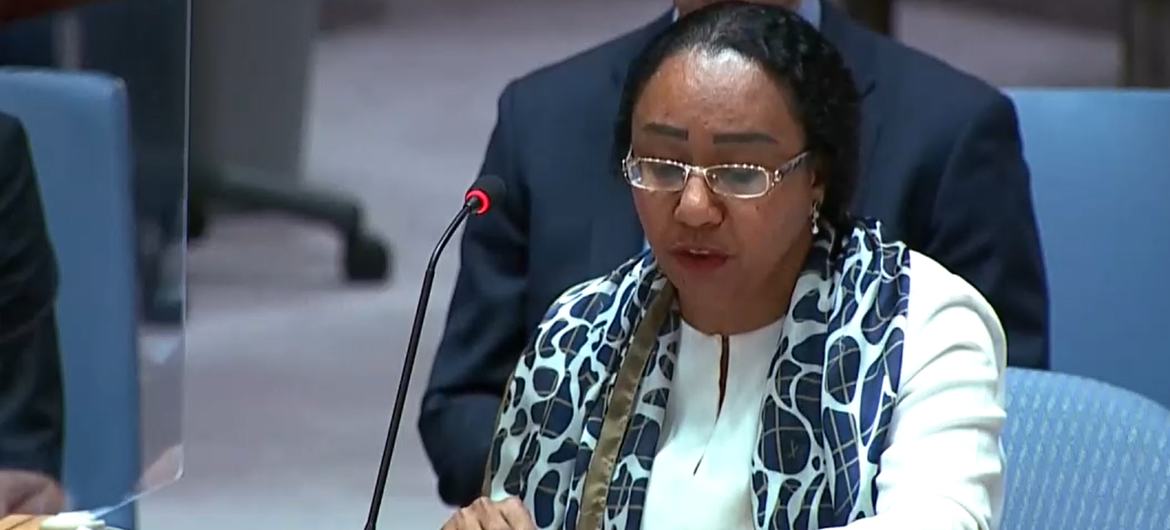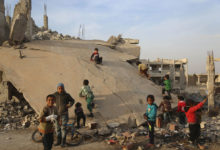Yemen truce holding, but full measures still not in place
 The “unprecedented” truce in Yemen has so far led to a reduction in fighting and other positive developments, but action is needed on its full implementation and to address rising humanitarian needs and insecurity, the UN Security Council heard on Tuesday.
The “unprecedented” truce in Yemen has so far led to a reduction in fighting and other positive developments, but action is needed on its full implementation and to address rising humanitarian needs and insecurity, the UN Security Council heard on Tuesday.
Ambassadors were briefed by two top UN officials who provided an update on the impact of the agreement between the Government and Houthi rebels, which was recently renewed for an additional two months, while also outlining the challenges that remain.
“The truce has now been holding in Yemen for two-and-a-half months, something unprecedented during this war, and something that seemed unimaginable at the beginning of this year,” said Hans Grundberg, UN Special Envoy for the country, commending the sides.
Reduction in fighting
There have been no confirmed airstrikes in Yemen, or cross-border attacks emanating from the country, since the truce was first announced in April. Civilian casualties have also seen a “significant reduction”, he reported.
However, casualties from landmines and unexploded ordnance are increasing as people venture into contaminated frontline areas that were previously inaccessible.
Despite the overall reduction in fighting, the UN also continues to receive reports of alleged violations from both parties including shelling, drone attacks, reconnaissance overflights, and the redeployment of forces.
Some armed clashes have also been reported, mainly in Ma’rib, Taiz, and Hodeidah governorates.
A military coordination committee comprising representatives from the two sides, and coalition forces backing the government, will meet monthly to address issues in a timely manner.
Flights and fuel
After six years of closure, commercial flights have been taking off from the airport in the capital, Sana’a, to Amman, Jordan, and Cairo, Egypt. Fuel also has continued to flow steadily through the crucial port in Hodeidah.
More than 480,000 metric tonnes of fuel cleared the port during April and May – greater than the amount which entered during the whole of 2021.
“The steady delivery of fuel has taken the pressure off vital services, significantly decreased queues at petrol stations that dominated Sana’a’s streets, and has allowed Yemenis to travel more easily throughout the country,” said Mr. Grundberg.
One critical outstanding issue is the opening of roads to Taiz, and other governorates. Roads currently open are “long and arduous”, he said, recalling a six-hour journey from Aden to Taiz city which would have taken half the time prior to the seven-year conflict between Houthi rebel forces and the internationally-recognized Government.

OSESGYThe meeting between Government of Yemen and Ansar Allah representatives on opening of roads in Taiz and other governorates, as per the truce agreement, held in Amman, Jordan, under the auspices of the UN Special Envoy for Yemen.
Road work ahead
Following a meeting in Amman with the two sides, the UN envoy presented a proposal on the phased re-opening of roads that also includes an implementation mechanism and commitments to the safety of civilian travellers. He has received a “positive response” from the Government and is awaiting answer from the Houthis, officially known as the Ansar Allah movement.
Mr. Grundberg warned that recent weeks have revealed the truce’s fragility, and delaying its full implementation could cause the deal to unravel.
“Resorting to transactionalism, threatening to condition the implementation of one element of the truce against another, and using escalatory media rhetoric, undermines the truce. It is ultimately up to the parties to safeguard the truce and to deliver on its promise for the benefit of Yemenis,” he said.
Implementation has also raised “more contentious issues with political implications”, for example around revenue management, civil sector salary payments, travel documents, and a more durable ceasefire.
‘A rare opportunity’
Mr. Grundberg told the Council that he will be moving forward on two fronts over the coming weeks. He will work with the parties towards full implementation of the truce, and on more durable solutions to the country’s pressing economic and security issues, underling the need for the Council’s continuous support.
“It is though, ultimately up to the parties to seize this opportunity, to negotiate in good faith, and to make necessary compromises for the benefit of Yemen as a whole. The truce offers a rare opportunity to pivot towards peace that should not be lost,” he said.
Humanitarian needs mounting
Ghada Mudawi, a senior official with the UN’s humanitarian wing, OCHA, also urged the Council to address the dire needs in a country where 19 million people are going hungry, with more than 160,000 on the brink of famine.
“Yemen’s humanitarian crisis remains as severe today as it was before the truce. In fact, the crisis could soon deteriorate. Allowing this to happen would run counter to the momentum the truce has generated and could undermine prospects for further progress,” she said.
Yemenis are being squeezed by soaring food prices stemming from Russia’s war in Ukraine, and currency depreciation has made the situation worse, while huge gaps persist in services such as water, health and education. More than four million Yeminis have been uprooted, including over 7,000 who fled in the past two months.
“Displacement during the truce period was mainly due to people searching for jobs and adequate food. People also fled due to clashes in some areas despite the truce. We hope the extended truce will see a more comprehensive end to fighting, including any localized clashes,” said Ms. Mudawi, Acting Director of OCHA’s Operations and Advocacy Division.

United NationsGhada Eltahir Mudawi, Deputy Director of Operations of the Office for the Coordination of Humanitarian Affairs,
Restrictions on aid workers
At the same time, aid agencies are also facing access constraints in Yemen. There have actually been more restrictions on their movements in recent months, mainly due to regulations issued by local authorities in several areas.
Insecurity is another concern for humanitarians as attempted carjackings, abductions and other attacks are on the rise, sometimes forcing them to suspend operations. The UN has called for the immediate release of two staff arrested and detained last November in Sana’a, which is controlled by the Houthis, and five staff kidnapped in Abyan governorate in February.
Amid these challenges, humanitarians continue to deliver aid to 11 million people across Yemen each month, but a UN response plan is currently underfunded – another major threat that has resulted in a reduction in food assistance and a scale back in many essential programmes.
Later this month, Sweden and the European Commission will host a meeting to discuss the humanitarian challenges in Yemen, a move Ms. Mudawi welcomed in the Council.



